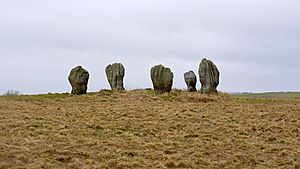Duddo Five Stones facts for kids
Quick facts for kids Duddo Five Stones |
|
|---|---|
 |
|
| Location | Northumberland |
| Architectural style(s) | British pre-Roman Architecture |
| Lua error in Module:Location_map at line 420: attempt to index field 'wikibase' (a nil value). | |
The Duddo Five Stones are an ancient stone circle found north of Duddo in North Northumberland, England. They are located about 4 miles (6 km) south of the Scottish border. These mysterious stones have stood for thousands of years, offering a glimpse into the past.
Contents
Discovering the Duddo Five Stones
The Duddo Five Stones are a fascinating example of a stone circle. These circles are groups of standing stones arranged in a circular pattern. People built them long ago for reasons we are still trying to understand.
What Are the Duddo Stones?
Today, there are five large stones standing in the circle. However, they were once known as the "Four Stones" until 1903. That's when the fifth stone was put back up to make the circle look more complete.
When archaeologists dug around the site in the 1890s, they found something interesting. They discovered empty spots where two more stones used to be. This means there were originally seven stones in the Duddo circle!
A Look Back in Time
The stones are made from a soft type of rock called sandstone. Over thousands of years, natural weather has caused deep cracks to form in them. This shows just how old they are.
These stones were first put in place during the Early Bronze Age. This was about 4,000 years ago! Imagine what life was like back then.
Visiting the Stones
The Duddo Stones are in a beautiful spot. From the circle, you can see amazing views of the Cheviot Hills to the south. You can also see the Lammermuir Hills to the north. It's a great place to enjoy nature and history at the same time.
You can reach the circle by taking the B5364 road. There's a gate and a path that leads up to the stones. Even though the stones are on private land, the owner has made a special path for visitors to use. This is called a permissive path.
In 2008, experts carried out an archaeological study at the site. They wanted to learn even more about the history of the Duddo Stones and the people who built them.
 | Sharif Bey |
 | Hale Woodruff |
 | Richmond Barthé |
 | Purvis Young |


